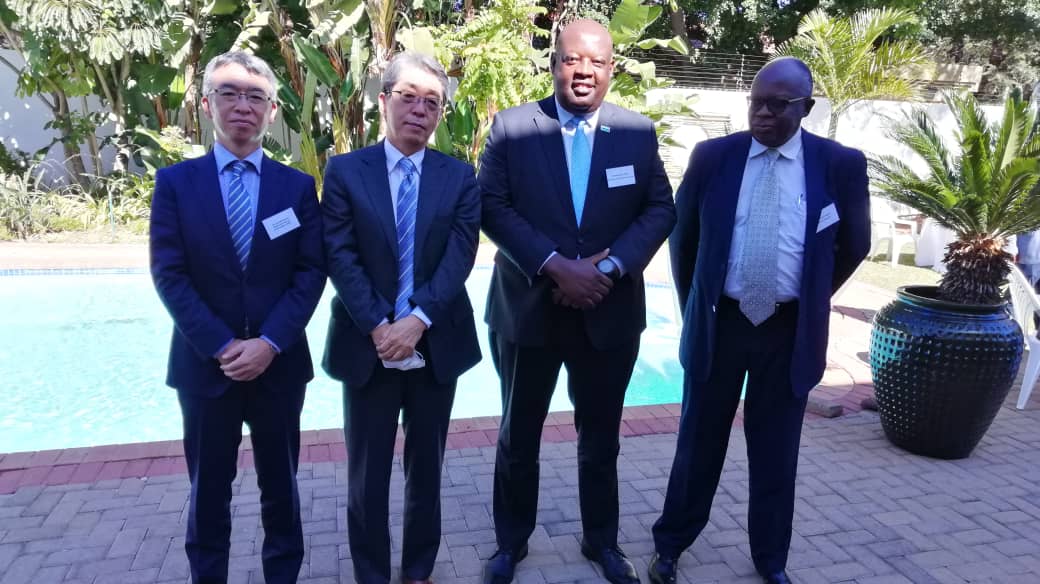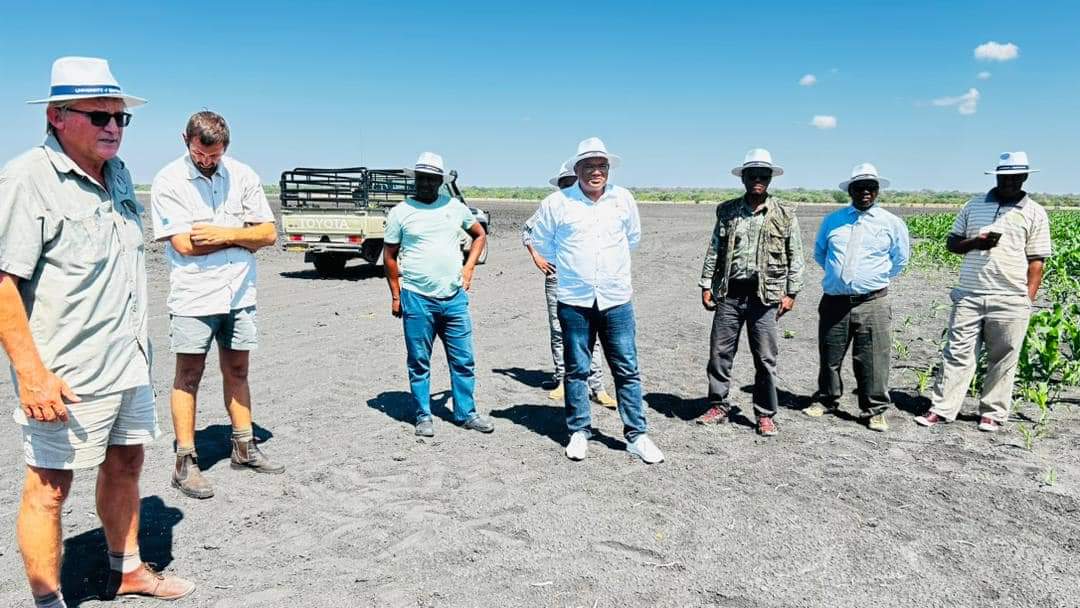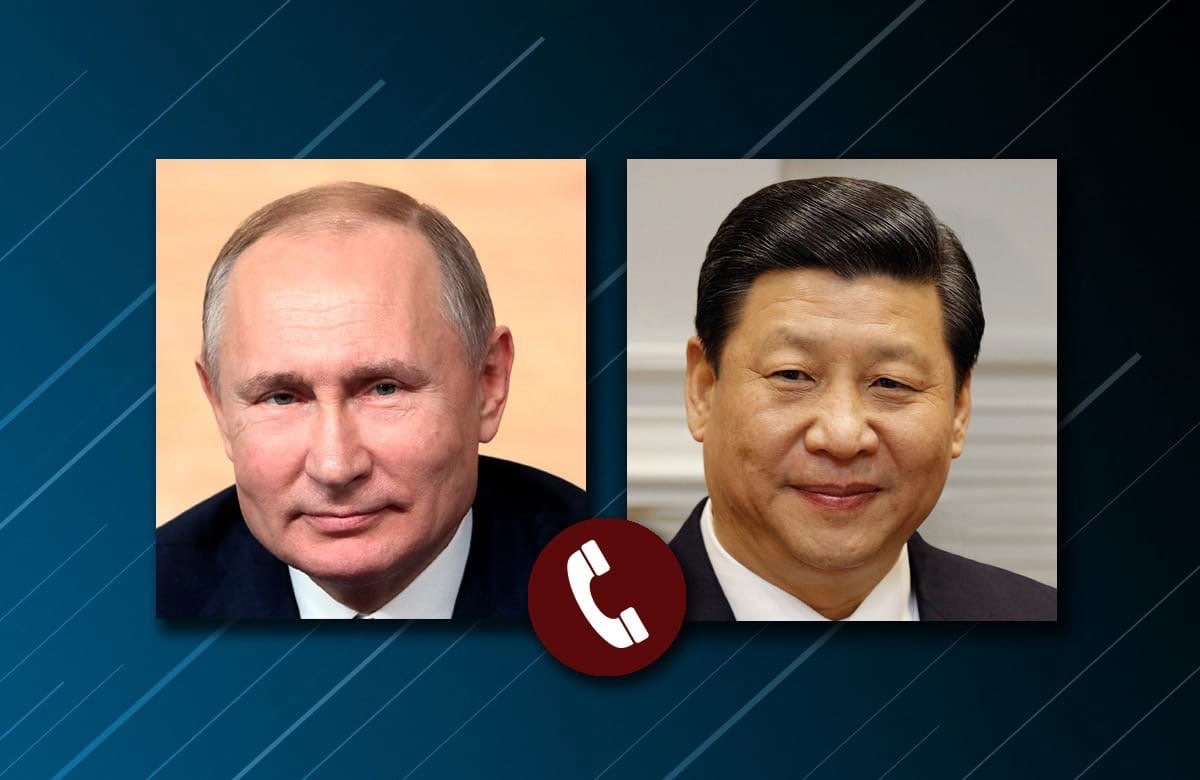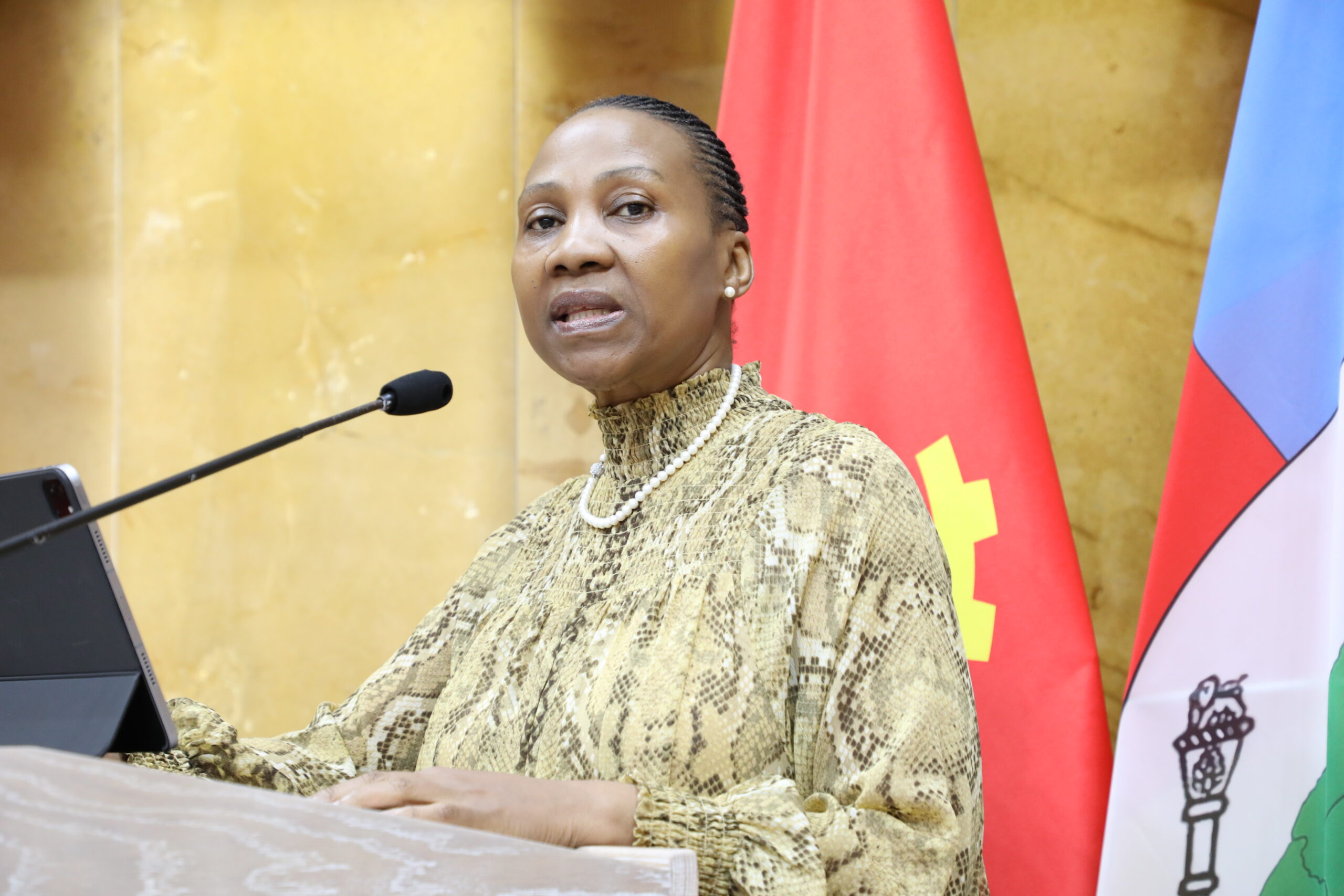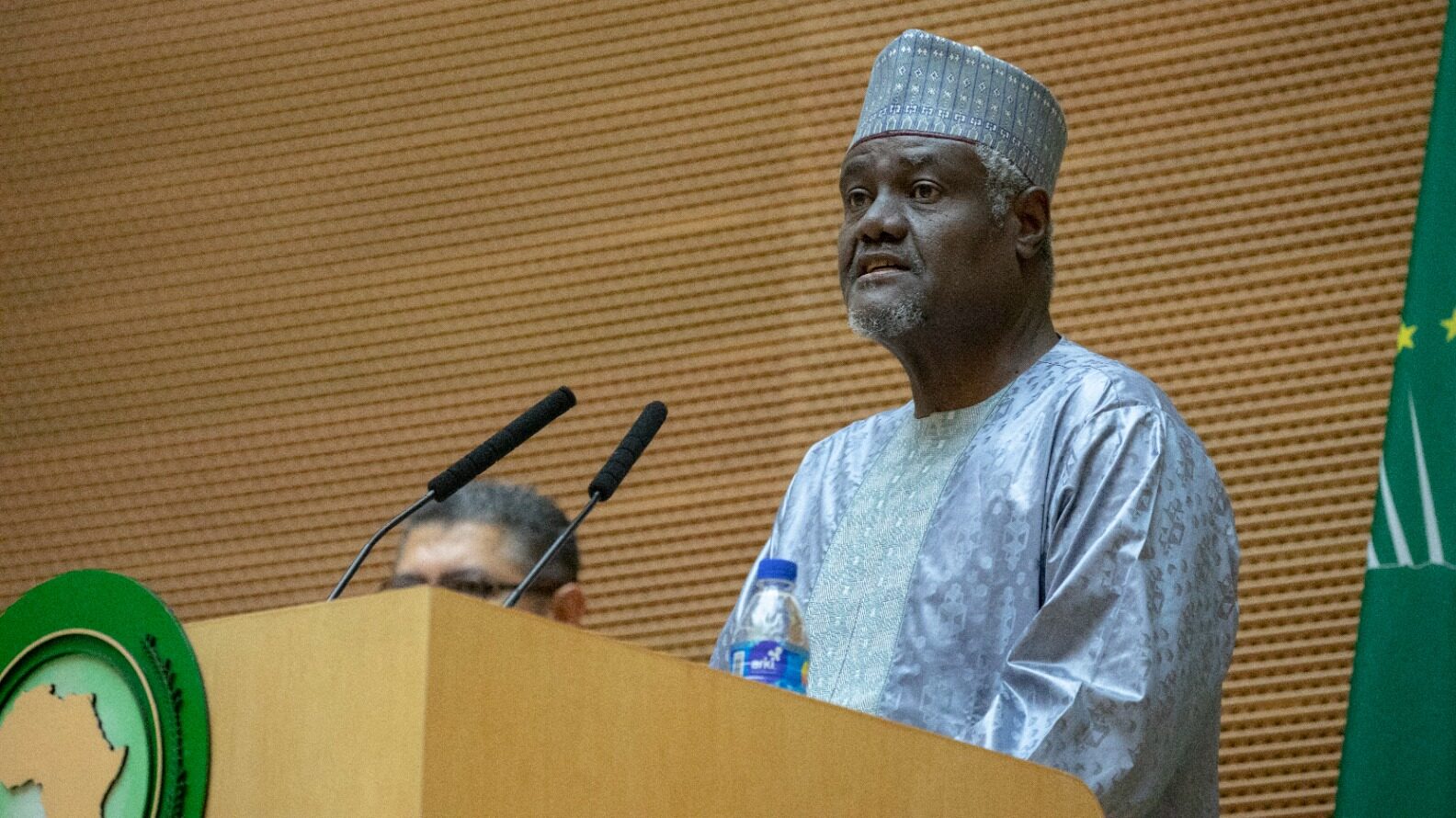
Musa-Faki-Mahamat-AU-Commission-Chairperson-delivering-Africa-Day-message- (AU Website)
The Pan Afrikanist Watchman
Chairperson of the African Union Commission, Musa Faki Mahamat lused Africa Day commemoration on May 25, to lend a devastating blow on Ukraine’s campaign to sway Africa from her time-tested commitment to the principle of non-alignment.
Ukraine’s Foreign Minister Dmytro Kuleba is on a charm offensive in Africa with a singular purpose – to convince Africa to condemn Russia’s annihilation of his country; or at best to support the US-led NATO alliance in the Russia-Ukraine conflict that has gone on for over a year now.

In his address on Africa Day Kuleba reminded Africa how his country has been a steadfast partner and why it was important for Africa to remember the sacrifices Ukraine made towards her liberation.
He said:
“Despite being geographically distant, Ukraine and Africa share deep historical ties. We have always shared and supported the aspirations of African nations towards independence, unity, and progress. As a co-founder of the United Nations, Ukraine has consistently defended and promoted the interests of African nations within the UN.
Over many decades, Ukrainian specialists from various fields helped construct hundreds of infrastructure facilities in dozens of African countries. Processing plants, hydroelectric power stations, ports, bridges, roads, hospitals, and schools.
Ukraine has also been proud to host thousands of African students. Many of them have become prominent political, business, and social leaders in their nations. We will be happy to welcome more young Africans who want to study and work in Ukraine.
In the past, not only students but also brave fighters of African national liberation movements were trained on Ukrainian soil. From 1965 to the 1980s, many of them were trained in Ukraine for the needs of the African Party for the Independence of Guinea and Cape Verde, the South West Africa People’s Organization in Namibia, the Zimbabwe African People’s Union, the People’s Movement for the Liberation of Angola, the Liberation Front of Mozambique, and the African National Congress in South Africa. This is our shared history. We are proud of it and won’t let anyone steal this common past from us.
Mozambican revolutionary and the first president of independent Mozambique, Samora Machel, once said: “International solidarity is not an act of charity: it is an act of unity between allies fighting on different terrains toward the same objective”. These wise words remain fully relevant today.
Ukraine has always been committed to maintaining peace in Africa and has significantly contributed to relevant global efforts. More than 300 Ukrainian blue helmets performed tasks within four UN missions in Africa: in the Democratic Republic of the Congo, South Sudan, Abyei Area, and Mali.
Ukrainian sailors have participated in international collective actions to counter maritime piracy off the coast of Somalia. As of February 2022, 80% of Ukrainian peacekeepers abroad were deployed in African countries.
We know the price of peace and the importance of maintaining it.
Today, Ukraine is reinvigorating its foreign policy toward Africa aimed at a Ukrainian-African renaissance.
We have recently adopted our first African strategy and intensified our political dialogue with many countries on the continent. This year, we are going to establish new embassies in different parts of the continent and plan to hold the first Ukraine-Africa Summit. I invite the leaders of your countries to take part in this important event.
We want to develop a new quality of partnership based on three mutual principles: mutual respect, mutual interests, and mutual benefits.
For more than a year, Ukraine has been fighting a defensive war for its freedom and independence against Russian invaders. This is not a border dispute, but a war of aggression. Russia tries to establish control over Ukraine because it does not recognize our right to exist as a sovereign nation and choose our path of peaceful and prosperous development.
Angola’s President João Lourenço gave a precise definition of the current situation based on the similar experience of his country. He said: “If we fought against the interventionists in the past, we understand that everyone else has the same right. And we do not understand how those people, who then helped us fight against the invaders, today annexed four regions of the neighbouring state.”
Ukrainians are a nation that fights for justice, against oppression, and against human rights violations. Supporting Ukraine is not about being pro-Western or anti-Western. It is about respecting the UN Charter, international law and order, as well as the right of every nation to choose its own peaceful path of development.
We are hearing calls for peace from various countries and leaders. We support them as such and think they need to be directed first and foremost to Russia as the country that started this war.
No other nation in the world wants peace more than Ukraine. But we know that real peace needs to be just and sustainable. We are open to discussing any peace initiative if it respects two principles: does not suggest territorial concessions and does not lead to a frozen conflict instead of peace.
Ukraine has a clear plan in this regard. It is called President Zelenskyy’s Peace Formula. This war is happening on Ukraine’s soil, so we consider it natural that a Ukrainian peace plan should be at the core of the peace effort. We invite African countries to join the implementation of the formula”.
And in direct response to the Foreign Minister’s appeal, the African Union Commission Head responded:
“To the shocks linked to the classic factors of fragility, such as excruciating debt service or the fall in the prices of raw materials, have been added the consequences of the intensification of the hegemonic struggle between the big powers.
In this international context of confrontation of divergent geopolitical interests, the will of each side threatens to transform Africa into a geostrategic battleground, thereby, recreating a new version of the Cold War that is very detrimental to the effectiveness of multilateralism, on which global peace and security depend.
In this zero-sum game, where the gains of others would translate into losses for Africa, we must resist all forms of instrumentalisation of our Member States, taken individually and collectively, by sharing the strong conviction that our future remains and will depend on the patient and methodical building of our unity. Africa must unite, said Kwame Nkrumah.
The imperative duty that challenges us, today, with insistence, in this international environment marked by identity withdrawals and outbursts of protectionism, is to give real, dynamic content to this unity, if we are determined to build the Africa we want.
On this solemn day, the celebration of which plunges us back into the spirit of the Founding Fathers of the OAU, I would like to amplify their voices, which continue to reverberate, beyond their graves, by making a vibrant appeal to all of us, Africans of the Continent and of the Diaspora, so that the strength of our unity and our long-awaited and expected solidarity operate, henceforth, as indispensable levers for our power and emancipation.
Let us rely on ourselves first. The solidarity of our friends and partners will also come to supplement”.
Minister Kuleba in his emotional appeal had reminded Africa of the great strides that Ukraine has lent Africa and continues to provide.
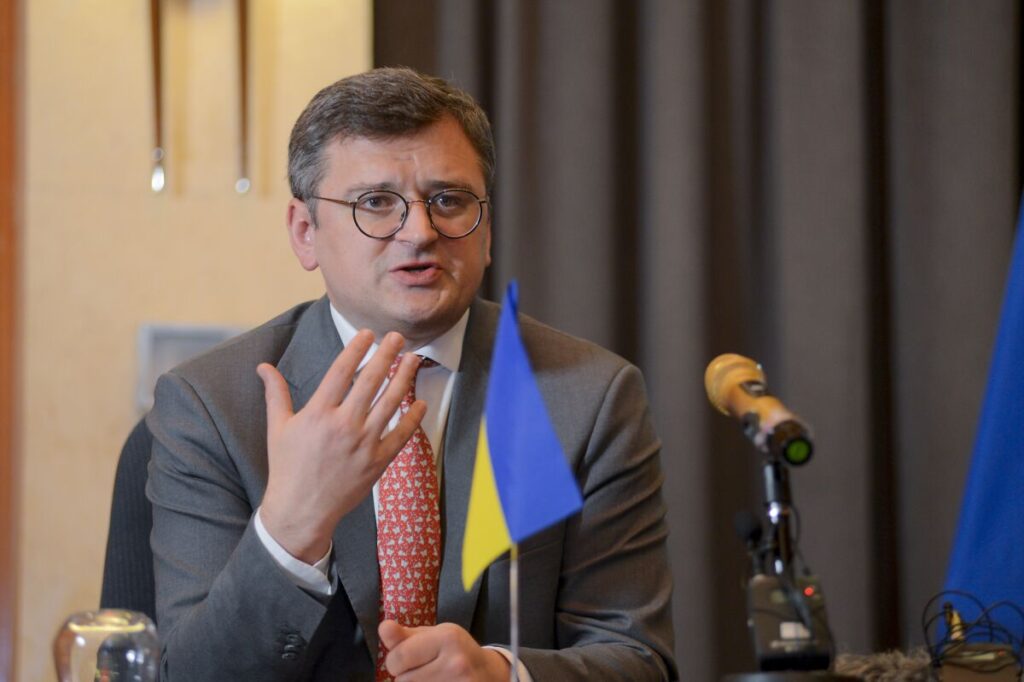
“Food security is a significant element of the formula, and the one especially important for African nations.
Even during this dark time of war, Ukraine spares no effort to maintain its role as a food security guarantor for Africa and many other regions of the world.
Despite Russia’s naval blockade of our sea ports, we have managed to partially unblock Ukrainian exports with the help of the UN and Turkiye. We have actively defended the initiative from Russian attempts to ruin it ever since. Its latest extension was a sign of relief both for our farmers and our customers abroad, including in Africa.
Within the initiative, an overall of 123 ships with more than 3 million tons of agricultural products have already been sent to the countries in Africa: Ethiopia, Libya, Morocco, Egypt, Kenya, Sudan, Tunisia, Somalia, and Algeria.
Our efforts are not limited to exports. We are also providing humanitarian aid under President Zelenskyy’s “Grain from Ukraine” program. We have already sent 6 ships with a cargo of 170 thousand tons of wheat to Somalia, Kenya, Ethiopia and Yemen within this program. More ships are being prepared. No family in Africa should suffer because of Russia’s war against Ukraine.
Our united voice should be strong in all international fora and within international organizations. And if they need to be reformed for that, including the UN Security Council, then we need to do so. We call for a more representative and democratic Security Council in which Africa, like all other world regions, will be represented. Ukraine also supports the idea of the African Union becoming a permanent member of the G20.
This is what I mean by mutual respect, mutual interests, and mutual benefits. By working together and supporting each other, we can achieve a lot. By talking to each other as equals and with respect, we can understand each other better.
This is why I am here, in Africa. To talk directly, without intermediaries. To treat each other individually, not as abstract regions or numbers on the voting screen of the General Assembly.
I am confident that in such a respectful manner we will be able to form new kinds of relationships and realize the full potential of a Ukrainian-African Renaissance for the benefit of all of our nations”.
In his message, Mahamat canvassed the heroic efforts of OAU Founding Fathers and the Vision of Africa – Agenda 2063.
On 25 May 1963, the Organisation of African Unity, the OAU, emerged from the baptismal font, here, in Addis Ababa. Sixty years later, in this month of May 2023, as every year, we celebrate the creative genius of the Founding Fathers who, in their PanAfricanist spirit, laid the foundation for an Africa to be built.
This venture, to stand the test of time, had to be based on solid shared values, the most fundamental of which was embodied in the collective quest for political freedom, peace and social prosperity, as an essential prerequisite for development.
The African Union which succeeded it, some twenty years ago, hardly deviated from this path. Better still, it made up for the shortcomings noted on the difficult path of Conflict management and resolution, both normatively and operationally.
Thus, during the celebration of the 50th Anniversary of the OAU in 2013, our leaders, by adopting Agenda 2063, coupled it with an ambitious project, that of “Silencing the Guns by 2020” in order not to leave to the future generations the burden of war and insecurity. This original deadline, for various reasons, has been revised.
Today, as we gather in this hall, with its evocative surname, the Nelson Mandela Hall, many of our Member States are in crisis. They are prey to deadly internal conflicts, fuelled by the unbridled quest for supreme power, with the corollary of significant loss of human life.
Beyond their political and social fragmentation, the significant elements of their national heritage are being destroyed and drowned in sometimes bloody pain.
When this tragic picture is compounded by other negative factors, such as the democratic decline through Unconstitutional Changes of Government, with their litany of oppression and gagging of freedoms, insecurity, the spread of terrorism, violent extremism, the uncontrolled circulation of arms, the harmful effects of Climate change, we have good reasons to place this celebration of the 60th Anniversary of the OAU, in the light of a meditation in solidarity with our brothers and sisters, who are forced to displacement or exile because of conflicts.
In the face of such a combination of circumstances and events that are asymmetrical to the proclaimed will of our leaders to build the Africa we want, there is need for reflection on the way to courageously identify the root causes but above all to endeavour to translate into deeds the pledge made, that of our Leaders to see Africa united.
The 60th Anniversary celebration intersects with other temporal milestones such as the 20th Anniversary of the AU, the launch of the Second Decade of implementation of Agenda 2063 and the mid-term journey of this Commission.
The concomitance of these various events confers a dazzling seal of historicity on this Year 2023 and particularly on this splendid and memorable day of 25 May 2023. It is in this capacity that Africa has mobilised its full cultural diversity, through discursive, human, culinary, artistic and other events within the compound of the Commission.
I would, therefore, like to invite all participants to have fun visiting the various exhibition stands that are offered by our Member States.
I know that my remarks sometimes pick on the shadows of the Continent, a side that cannot hide the lights that sparkle on the other side, that of independence and victory against Apartheid, that of significant economic and scientific progress, sports, arts, the growing international role of Africa and so on.
I do not belong to the intellectual school of Afro-Pessimism but on the contrary to that of an optimistic but realistic Pan Africanism at the same time.
I know that despite the difficulties of all kinds, Africa remains characterised by its great capacity for resilience. It was able, despite alarmist forecasts, at the time, to hold firm in the face of the onset of the COVID 19 pandemic.
Better still, it seized the opportunity of this misfortune to rethink its Health Strategy, in a concerted action by our Heads of State and Government. An evidence that if Africa wants, it can, whatever the nature and type of adversity it may have to face.
This is what the AU records shows through the results of the evaluation of the implementation of the First Decade of Agenda 2063.
Significant progress has been made in various areas. They could have been greater, had it not been for the exogenous shocks that accentuated the fragilities which our efforts were already working to overcome.






